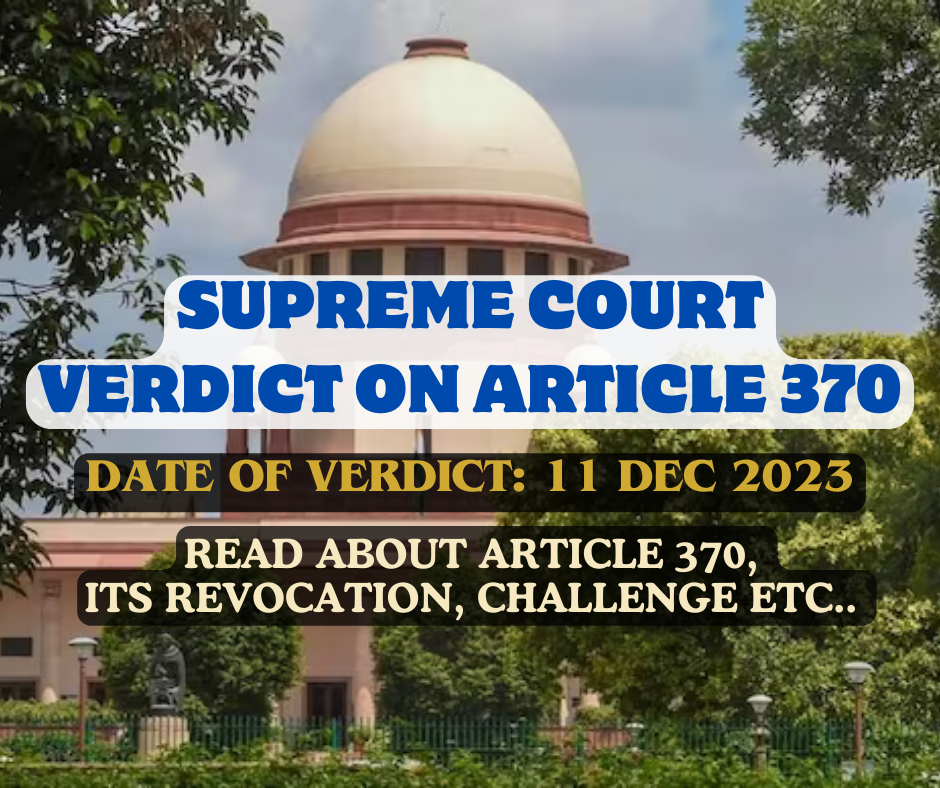
Table of Contents
Supreme Court Verdict on Article 370 on December 11
The much-anticipated Supreme Court verdict on Article 370 is set to be delivered on December 11. This critical decision follows a series of petitions challenging the abrogation of Article 370 of the Indian Constitution in 2019. Let’s delve into the complexities surrounding this verdict, exploring the background, the challenges posed, and the implications of the potential judgment.
The Constitution Bench
A five-judge constitution bench, led by Chief Justice DY Chandrachud and comprising Justices Sanjay Kishan Kaul, Sanjiv Khanna, B R Gavai, and Surya Kant, will be responsible for delivering the verdict.
Background: Why the Challenge?
The challenge revolves around the decision taken by the Central government on August 5, 2019, to revoke Article 370. President Ram Nath Kovind issued Constitutional Order 272, initiating changes to Article 367, which, in turn, impacted the reading of Article 370. This paved the way for alterations to be made to the contentious article.
In rapid succession, Rajya Sabha recommended the cessation of the Article’s operation, and the next day, President Kovind formalized this recommendation through Constitutional Order 273, confirming the abrogation of Article 370. Subsequently, on August 9, Parliament passed the Jammu and Kashmir Reorganisation Act, leading to the bifurcation of the state into two Union Territories – Jammu and Kashmir and Ladakh.
Petitioners’ Challenge
The petitioners have contested the validity of CO 272 and CO 273, questioning the President’s authority to render the provision inoperable. The Supreme Court during the hearings also probed into how Article 370, initially labeled as a temporary provision, assumed permanency after the Jammu and Kashmir constituent assembly’s term concluded in 1957.
Some petitioners argued that the provision could not be abrogated without the concurrence of the Jammu and Kashmir Constituent Assembly, which had concluded its term in 1957 after drafting the state’s Constitution. The Supreme Court raised pertinent questions, particularly about who could recommend the revocation of Article 370 in the absence of a constituent assembly in Jammu and Kashmir.
Understanding Article 370
Article 370, incorporated into the Constitution on October 17, 1949, granted special status to the erstwhile state of Jammu and Kashmir within the Indian Union. The article exempted J&K from the Indian Constitution (except Article 1 and Article 370 itself) and allowed the state to formulate its own Constitution. It curtailed Parliament’s legislative powers concerning J&K, necessitating “consultation” with the state government for extending central laws related to the Instrument of Accession.
Special Status and Other States
Article 370 was not an isolated provision; similar special status provisions exist for other states like Mizoram, Nagaland, Maharashtra, Gujarat, etc., under Article 371, from 371A to 371I.
You can read Special Status given to other states in the article 371 of the Constitution on the link: Article 371
The Revocation of Article 370 and Its Motivation
The revocation of Article 370 has been a longstanding aspiration for certain political factions. It found a place in the BJP manifesto and has been a central issue for the Rashtriya Swayamsevak Sangh (RSS), the ideological parent of the BJP.
As early as 1953, movements advocating “complete integration” gained traction in Jammu and Kashmir. Figures like Balraj Madhok and Syama Prasad Mookerjee, the founder president of the Bharatiya Jana Sangh (the precursor to the BJP), spearheaded campaigns for the revocation. The slogan, “Ek desh me do vidhan, do pradhan, do nishan, nahi chalega, nahi chalega (One country cannot have two constitutions, two Prime Ministers, and two flags),” echoed the sentiments of those seeking unity.
Anticipating the Supreme Court Verdict on Article 370
As the Supreme Court prepares to deliver its verdict, the nation awaits clarity on the constitutional intricacies surrounding Article 370. The judgment will not only impact the historical context of Jammu and Kashmir but will also set a precedent for the interpretation of constitutional provisions with far-reaching consequences.
Conclusion and Future Implications
The Supreme Court’s decision on Article 370 will undoubtedly shape the narrative around constitutional amendments and their implications on special status provisions. The complexity of the issues raised during the hearings underscores the significance of this verdict, which will be closely scrutinized for its legal, historical, and political ramifications. Stay tuned for the verdict on Monday, as the Supreme Court navigates through the intricate web of constitutional challenges surrounding Article 370.
You can also read:
- Rs 2000 Note News: 97.26% Returned to RBI – Rs 9,760 crore still in circulation!!
- Unemployment Rate in India: A Comprehensive Analysis of the Sep 2023 Quarter.
- Don’t Miss These 5 Money Deadlines in December 2023! Unlock Financial Opportunities Now!
- Canada Updates Work Permit Rule: Impact on Post-Graduation Work Permits (PGWPs), 31 Dec is Deadline!

1 thought on “Supreme Court Verdict on Article 370 on December 11, Read Details..”